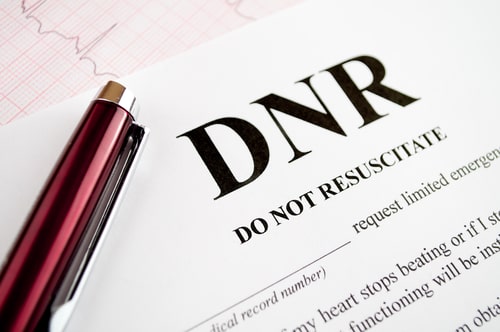Do-not-resuscitate (DNR) orders and advanced medical directives (AMDs) are legal documents in Texas that allow individuals to make decisions regarding their medical care in advance. If you want to sign an advanced medical directive such as a do-not-resuscitate order, contact an experienced estate planning lawyer to start the process today. Your lawyer will be able to explain their purpose, legal implications, and how they help ensure a person’s medical wishes are respected, even if they are unable to communicate them during a medical emergency.
Do-Not-Resuscitate Orders (DNR)
A DNR is a medical directive that instructs healthcare professionals not to perform cardiopulmonary resuscitation (CPR) or other life-saving measures in the event of cardiac or respiratory arrest. A physician typically writes DNR orders based on a patient’s informed consent. These orders are especially relevant for people with terminal illnesses or those who have made a conscious decision to avoid aggressive medical interventions. DNR orders must comply with state laws and are typically recorded in a patient’s medical records to ensure they are honored during emergencies.
Advanced Medical Directives (AMDs)
AMDs go beyond DNR orders and allow individuals to express their medical preferences and decisions in various situations. An AMD typically includes a living will, healthcare power of attorney, and sometimes additional instructions regarding specific medical treatments and end-of-life care. A living will outlines a person’s preferences for medical treatments, such as using life support or administering pain medication. A healthcare power of attorney designates a trusted person to make medical decisions on behalf of the individual if they become incapacitated and unable to communicate their wishes themselves.
Legal Implications and Importance
DNR orders and AMDs have significant legal implications. They are legally binding documents that ensure a person’s right to make decisions about their own medical care. Healthcare providers are obligated to honor these directives, and failure to do so can result in legal consequences. People need to discuss their medical wishes with their healthcare providers, family members and designated healthcare agents to ensure everyone is informed. Regularly reviewing and updating these documents is also recommended to reflect any changes in medical conditions, treatment options, or personal preferences.
Contact a Dallas, TX Advance Medical Directives Attorney
If you are interested in signing an advanced medical directive such as a do-not-resuscitate order, contact the established and respected Dallas, TX advanced medical directives lawyer with Andrew Dunlap Attorneys, PLLC. Call 972-807-6357 for a private consultation.
More Information
-
Three Types of Advance Medical Directives in Texas Estate Planning
Estate planning is not just about distributing your assets; it involves planning for future medical…
-
Three Misconceptions Regarding Advance Medical Directives
Advance medical directives (AMDs) are legal documents that allow individuals to express their healthcare preferences…
-
When Does an Elderly Person Need a Medical Power of Attorney?
As people age, their medical needs become more complex. It is important for a person…
-
Understanding the Basics of a Special Needs Trust
A special needs trust (SNT) is a crucial legal tool designed to provide for individuals…
-
What Are the Benefits of an Irrevocable Trust?
When we discuss trusts in the context of estate planning, we often focus on revocable…
-
Do I Need to Prepare Before Going to Probate Court?
Facing a probate court appearance can be a daunting experience for anyone. Before going to…









